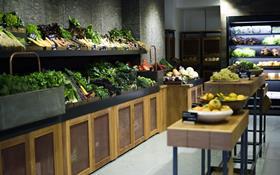
Sustainability in retail didn’t use to extend much further than Fairtrade bananas and the occasional bag for life, but in recent years the retail sector has embraced a whole host of new initiatives to try to cut food waste, encourage seasonal consumption and shorten the supply chain.
At the major supermarkets wonky veg has become a bit of a buzzword, with each of the big-four retailers trying to cut food waste by selling produce that falls outside of the usually strict size and shape specifications. Since revealing that it threw away nearly 30,000 tonnes of food in the first half of 2013, Tesco has led the charge in tackling supermarket waste, promising data transparency and committing to the Sustainable Development Goal of halving food waste by 2030.
Other retailers have upped their game too, with Asda winning Product of the Year for its £3.50 wonky veg box; Morrisons adding products to its Wonky Veg range; Sainsbury’s encouraging the use of blemished bananas; and Waitrose launching a Live Wise food waste campaign.
While these efforts are laudable – and much needed given that the UK created 7.3 million tonnes of household food waste in 2015 – some would argue they don’t change the bigger problems associated with supermarkets’ year-round supply model.
The ‘courgette crisis’, while slightly melodramatic in the way it was reported, raised important questions over the sustainability of Britain’s heavy reliance on fresh produce imports. Vernon Mascarenhas of seasonally-focused wholesaler First Choice Produce told FPJ back in February that the Spanish shortages were a “big wake-up call” for the industry and urged British restaurants to switch to seasonal produce in the winter months. Although there is more evidence of this in foodservice, the retail sector is unlikely to change, with customers expecting to see products on shelf year round regardless of their seasonality.
A major reason for this culture of year-round availability, according to high-end London wholesaler and retailer Natoora, is that it suits the prevailing supply model better to have one line that runs all year than hundreds of hyper-seasonal lines that require a higher level of response and flexibility. “There is nothing natural about wanting peaches in November,” says head of buying Fede Cervellin. “If early-season citrus, pomegranates, and a wealth of apple and pear varieties were more visible in winter, then we would start to learn otherwise.”
This is where independent retailers come in. Free from the self-inflicted pressure of having to meet consumer demand and stock Kenyan green beans in December, a growing number of independent greengrocers are focusing on locally-sourced seasonal produce – a model that cuts costs, improves freshness and, importantly, benefits the environment.
Grant Fox, who owns Seasons of England in Herne Hill, London, estimates that 85-90 per cent of the vegetables in his shop at the moment are English. “It’s as local as we can get it,” he says, mentioning his rainbow chard from Orpington, just 12 miles away. “Why should our produce have 4,000 air miles on it from Peru?”
Fox deals mainly with independent smallholdings, meaning his producers cannot be blamed for some of the harmful environmental impacts of intensive large-scale production. And he “pushes English stuff ahead of foreign produce all the time,” he says.
When it comes to pricing, Seasons of England is also very competitive, with Fox claiming that 90 per cent of the produce he sells is cheaper than at the local supermarkets. “It is a myth that supermarkets have killed the independent greengrocer trade. You can’t go into the supermarket and buy rainbow chard or heritage bunched carrots,” he says – although it probably helps that his shop is located in an area of London where there is demand for such things.
In any case, Fox insists that more and more people are switching back to shopping at their local greengrocer as the likes of Jamie Oliver and Hugh Fearnley-Whittingstall extol the virtues of buying local and eating seasonal produce. “I could open up one of my shops in five or six areas in London,” he claims. “If you can just get yourself ten grand together – a government loan or whatever – you can set up an independent and you can smash it. The work’s there if you can be arsed to put in the hours.”
This growth of interest in local, sustainable production is something that Debbie Leigh of the organic cooperative Riverside Market Garden also refers to. Based near Cardiff, Riverside Market Garden calls itself “a new ethical model for sustainable local food production” and has been praised by former Green Party leader Natalie Bennett for “doing great work” to create a more localised food supply system.
Although it is a small operation, with only one grower, and around 100 local customers, Leigh insists that interest in local cooperatives of its kind is growing. “We’ve seen a bit of an uptake of people who left Riverford Organic in Devon and switched to our veg box scheme because we’re more local,” she says. But there needs to be a big leap in scale, before such operations can have a significant impact on sustainability and environmental protection.
At the supermarkets, a dramatic shift from a globalised to a localised supply model remains unrealistic, but there are positive signs of change at the fringes of the retail landscape. And maybe one day this could build enough momentum to bring about more wide-reaching change. As Cervellin from Natoora says, “it is only by scaling up the model that we have – of constructing our own, direct sourcing networks – that our ethos and values will force a change in the industry.”



